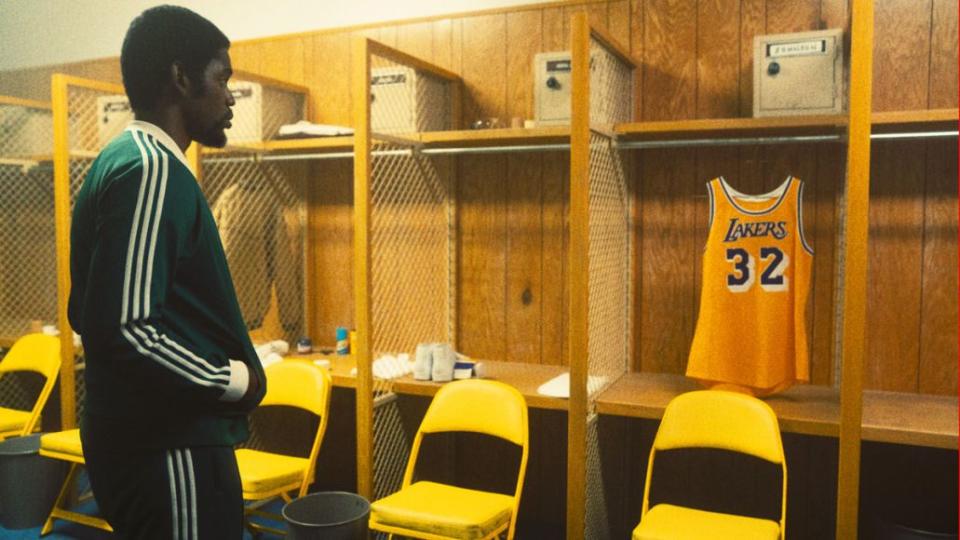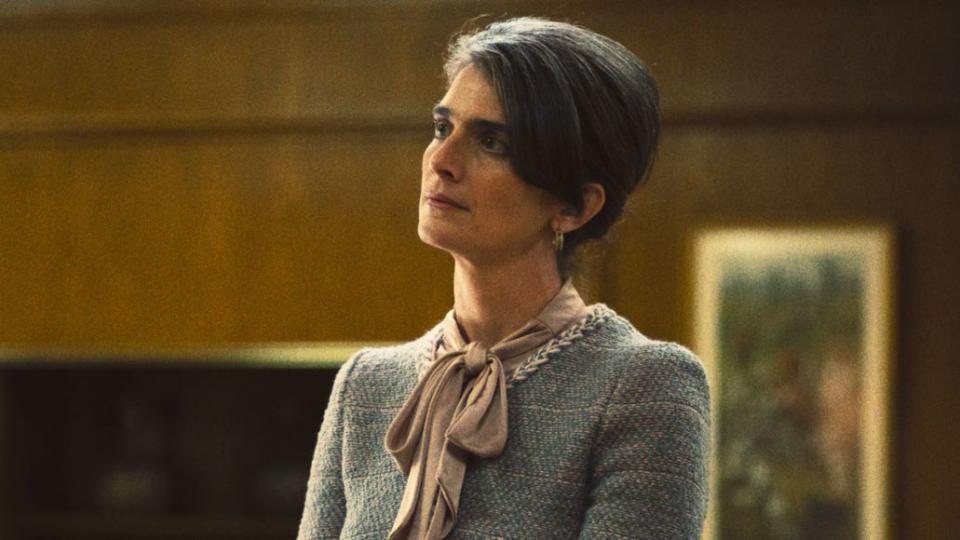Winning Time Review: HBO’s Star-Studded Tale of the Los Angeles Lakers Delivers Plenty of Razzle-Dazzle
The post Winning Time Review: HBO’s Star-Studded Tale of the Los Angeles Lakers Delivers Plenty of Razzle-Dazzle appeared first on Consequence.
The Pitch: In 1979, a guy named Dr. Jerry Buss (John C. Reilly) decided he’d like to own the Los Angeles Lakers, at that point a middling NBA team with no razzle-dazzle. Seeing potential there that no one else did, Jerry used his passion and big brain for business to fearlessly tackle the challenge of not just improving the Lakers’ record but creating a whole new type of entertainment experience — one which, we know with hindsight, would totally change the conception of professional sports in America.
One of Jerry’s biggest moves is signing rookie player Earvin Johnson Jr., better known as Magic (Quincy Isaiah), while also finding a new coach in Jack McKinney (Tracy Letts), who has some bold ideas on how to change the kind of basketball being played by the Lakers. While their inaugural season is loaded down with bad luck, the glimmers of greatness are clearly there, as the dawn of a whole new era beckons.
The Title Was Not Their First Choice: Based on the book Showtime by Jeff Pearlman (for obvious reasons, this HBO drama did not get to use the name of a rival network for its title), the pilot for Winning Time is Adam McKay‘s first TV directing gig since the 2018 pilot for Succession, and he’s pretty unleashed in his first episode, bringing his signature post-modern flare and use of direct address to capture the many, many personalities caught up in this story.
McKay also establishes a Super 8-derived aesthetic that is retro to the point of being almost aggressively ugly, but somehow that aesthetic suits the nature of the narrative. Subsequent directors, including Jonah Hill, Tanya Hamilton, and Payman Benz follow suit with vigor, ensuring that even when delving into subject matter that might not be the most compelling material, like bank loans or the minutiae of defensive strategy, the action on screen is kinetic and engaging.
While Winning Time doesn’t care too much if you’re not familiar with the particulars of Lakers history — it instead simply assumes that you’re familiar with most of the notable personalities on screen — it does put in some heavy lifting when it comes to establishing things like why Jack McKinney’s approach to offensive strategy was so game-changing; there’s a lot of The Big Short in this approach, which may or may not prove grating.

Winning Time (HBO)
That Cast, Though: As is now well-known, McKay and Will Ferrell’s friendship hit the skids after McKay decided to go with Reilly instead of Ferrell for the role of Jerry Buss, and after watching the show, it’s hard not to see one reason why Ferrell might have been so upset: It’s a helluva part, a larger-than-life character with lots of wild quirks.
As Jerry, Reilly literally owns the screen anytime he’s at the center of a scene, speaking directly to the camera nearly as much as he talks to the other characters, and somehow managing to be likable even in the least likely of moments. It’s the role of a lifetime for an actor like Reilly, whose career has been such a fascinating back and forth between comedy and drama that he actually sang a little song about it at the 2007 Oscars (with Will Ferrell, awkwardly enough).
Here, he’s at the full height of his powers, and it’s remarkable to behold; in the hands of a less likable actor, Winning Time would fall apart, but Reilly sells Jerry as a sympathetic and exciting protagonist without ever feeling cartoonish.
Reilly is just the tip of the iceberg, casting-wise, as watching Winning Time is a lot like watching a classic Altman or Wes Anderson movie, where, on a regular basis, you can count on a well-known actor popping in to play another oddball character. It’s a stacked cast down to even the smallest of parts — as just one example, Julianne Nicholson, you deserved that Emmy award for Mare of Easttown, and you also deserve more screen time here as the wife of McKinnon.
That’s true for pretty much every one of the many great actresses who are a part of this ensemble. But when it comes to the treatment of its female characters, Winning Time straddles a strange line, as it’s pretty actively committed to giving as many of these women as much agency as possible… while also acknowledging that the culture of the time, whether you be a business mogul or a basketball star, considered the availability of “girls” to be yet another perk of fame.
It’s a culture that Claire Rothman (Gaby Hoffman) is keenly, cruelly aware of — as general manager of the Forum, her job is to keep the business afloat, and she’s unflagging in that commitment, even while orchestrating the creation of the Laker Girls, a cultural institution that might not be considered a feminist achievement.
(While the show does remember to mention that Paula Abdul, played here by Carina Conti, got her start as a Laker Girl, it’s treated more like trivia and less like an opportunity to explore that aspect of the business a little more.)
Despite her limited screen time, Claire is one of many fascinating characters that easily could be the focus of an entire miniseries of their own; really, the show is packed with so many great potential stories that it’s reassuring to hear that Winning Time will not be a limited series, and the writers are already at work on a potential second season.

Winning Time (HBO)
In addition to the big names, newcomer Quincy Isaiah tackles the role of Magic Johnson with vigor, managing to capture the man’s charm, while Solomon Hughes (a Harlem Globetrotter and academic) has a far more challenging task in portraying the gravitas of Kareem Abdul-Jabbar. The journeys faced by these men are of course completely different, but both actors manage to deliver reasonably well-developed portraits of their respective, exceptionally famous personas.
The Verdict: Key to any great sports story for the screen is getting the audience invested in the ultimate fate of the team: Will they win? Will they lose? If they win, how will it change the lives of the team members? If they lose, will the team still go onto greatness in other ways? This is maybe the element most lacking from Winning Time, as bold and fun as it might be, because it’s so centered in its worship of the Lakers that it rarely causes the viewer to question whether the Lakers might ever really lose.
Here and there, the stakes do feel real and serious — for example, there’s a key game, played in the later part of the season, where its outcome has serious behind-the-scenes ramifications. But this show is first and foremost a love letter to not just the team but its legacy; to root for the 1979 Lakers as depicted in the show isn’t rooting for the underdog, it’s rooting for King Kong.
Winning Time moves like lightning and keeps you always on your toes, but as for that moment when the buzzer rings out just as someone hooks one last hail Mary shot at the hoop… Your breath might not catch in your throat.
Where to Watch: Winning Time premieres Sunday, March 6th at 9:00 p.m. ET on HBO.
Trailer:
Winning Time Review: HBO’s Star-Studded Tale of the Los Angeles Lakers Delivers Plenty of Razzle-Dazzle
Liz Shannon Miller
Popular Posts
R.I.P. Mark Lanegan, Rock Pioneer and Screaming Trees Frontman Dead at 57
Netflix Unveils Release Date for Ozark Season 4, Part 2 and Shares Teaser: Watch
First Print VHS Tape of The Terminator Auctioned for $32,500
Plagued with Sound Issues, Kanye West's Donda 2 Listening Event in Miami Was a Star-Studded Fiasco
Robert Fripp and Toyah Are Right on Time with The Black Keys' "Lonely Boy": Watch

